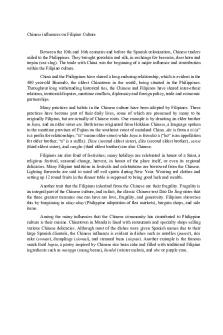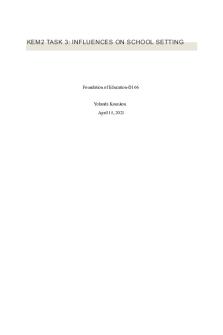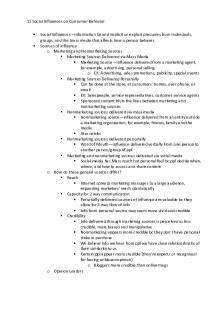De100 finished ema - influences on human behaviour PDF

| Title | De100 finished ema - influences on human behaviour |
|---|---|
| Author | madison ross |
| Course | Investigating psychology 1 |
| Institution | The Open University |
| Pages | 3 |
| File Size | 78.6 KB |
| File Type | |
| Total Downloads | 51 |
| Total Views | 130 |
Summary
influences on human behaviour ...
Description
Rebecca Clayton(F5406489)
Option A ‘Human behaviour is always a product of external influences’ Discuss this claim, drawing on examples from Chapters 1, 4 and 9 of Investigating Psychology. 100 percent of the mark Word limit: 1500 words
Human behaviour results from external influences, or so it is claimed this essay will outline and discuss theories surrounding this claim. Evidence provided within this essay will be based around the work conducted by Adorno et al (1950) and his “authoritarian personality” theory. “The theory of behaviourism” will also be included by B.F. Skinner (1953) and lastly The Loftus and Palmer (1974) study based around false memories. Motivation, perception, learning, attitudes and beliefs are the fundamental principles surrounding the influences seen in individual personality traits, therefore the study of human behaviour requires extensive research around individuals of all diversities from multiple environments to acquire the information for what in turn has implemented their individual behavioral traits. Some traits are unique to the individual and oppose no influences, whilst others traits that are more commonly seen as a product of predisposition and are shared across many. However Lee Ross (1977) and his concept of “fundamental attribution error” (which refers to explaining the cause of a person's actions to be a result of internal characteristic and influence as opposed to external reasonings) does permit the opposed claim to be argued. The studies discussed will be supported by evidence showing how day to day choices that we may conjecture as internal characteristics to be influenced by external sources such as; childhood development, social environments, religious beliefs, politics and also social associations alongside many more. Firstly we will look at the work conducted by Adorno et al (1950), he suggested that obedient individuals are the result of harsh disciplinary upbringing, thus creating individuals to obey unconsciously the consequences surrounding discipline from parents or other possible implications disobeying may bring was fearful and deterred disobedience away. With this Adorno (1950) went on to investigate why nazi soilders were so able to persecute and kill members from other minorities such as the jews in WW1. his belief being it was the principle surrounding a specific personality trait. He developed a psychometric test, creating the famous F-scale relationships between prejudiced beliefs and an individual's personality type would then be measured. Findings showed individuals who had scored highly on the F-scale were identified as “strong beings” and were preoccupied with their own status as well as others. Cognitive style showed no grey areas between the categories of people; they also displayed specific stereotypes about other groups and a strong positive correlation was seen between authoritarianism and prejudice. “ Adorno et al. argued that participants scoring highly on the F-scale were revealing an authoritarian personality; and, in contrast, those with low scores were revealing a non-authoritarian, more liberal personality.”(McAvoy.J, 2012, P.32) Although Adorno’s (1950) theory can not be accounted for in obedience relating to authority across all political aspects it does in fact show us that authoritative personalities were formed during childhood, where those who adhered to a discipline by strict parents were more inclined to inherit an authoritative personality. Characteristics said to be included
regarding authortism is; being extremely respectful, obedient towards others that are of authority, and adhering to rules. Conspectus of Adorno’s work provides us with evidence that not only does politics ramificate influence but personal beliefs also, which seriatimly is created through learning in childhood development thus shaping human behaviour within individuals. Following this B.F Skinner (1953) created the theory of behaviourism with the use of quantitative analysis, Skinner focused his time observing different kinds of human behaviours as well as animal behaviours. He supposed that personality is the element developed around external events as well as past psychological experiences shaping the effect of one's behaviour. He also suggested that differences in behaviour are subject to individual learning experiences, both positive and negative reinforcement was focused upon greatly with Skinner, hereby “operant conditioning” was used (a concept to show changing behaviour by the use of reinforcements), he concluded that these reinforcements determine a behaviour that's either good and therefore to be encouraged or bad and therefore needs to be deterred . Skinner claimed that “elicited behaviour” is created by a stimulus and “emitted behaviour” was created by its consequence, data analysis to his study showed a clear distinction between the two concepts. In short skinner therefore enables us to see that behaviour is determined by consequences. Whether the behaviour is good or bad Skinner concludes that behaviour is infact a result of an individual's response to an event or stimulus that has occurred within the individuals environment. “ skinner urged a reform of society so as to introduce reinforcement for environmentally responsible behaviour” (Toates,F. 2012, P.186) However to adduce facts surrounding this study, limitations were seen within Skinner's work as the complexity towards human behaviour shows that it can not be relevant to all individual cognitive factors as they are not all taken into account within the study. It does however enable us to see that effective parenting is more likely to result in a child with good behavior if adequate punishment is implemented to deter bad behaviour to continue. Similar to Adorno’s (1950) study Skinner hereby shows once more that childhood is fundamental in regards to shaping human behaviour allowing behavioural traits to be a reflection of their upbringing. Lastly is the “The Loftus and Palmer” (1974) study wherefore a different approach surrounding behaviour is seen with in this study, questionable ecological validity was apparent based upon the qualitative data analysis, a classic experiment was implemented for investigating leading questions and visual impacts to the accuracy of eyewitness testimonies, Elizabeth loftus also illustrates that if an individual is hereupon exposed to new materials around events being recalled, that this also could implicate a difference in how individuals perceive such events in comparison to the actual event, thus showing that original memories can therefore be modified or supplemented with the use of rhetoric language and other visual persuasions. This study in short provides evidence that witnesses are not always a reliable source, how questions are asked or worded alongside other influences such as imagery can create confabulation in individuals. Major impacts upon a person's semantic memory ( remembrance of factual information) is the result of such misleading influences also referred to by Loftus as the “misinformation effect”. Subsequently this shows their decision making and recalling being not all of their own cognitive processing. “providing post-event information can have a powerful effect on memory, and in regard to misinformation, it can result in people remembering things that never happened!” (Brace,N & Pike,G ,2012, P. 380) To summarize this we see exposure to misleading information from an
external source leading to a change in one's attitude markedly creating a change within the behavior. Although this is not shaped through childhood like others discussed prior, it does however provide evidence that leading questions and the use of visual aids is of importance when defining reasonings for human behaviour as a whole and can therefore could be argued influential language to any age group surrounding many other life occurrences has potential. To evaluate all opposed we see knowledge surrounding human behaviour is continuously being researched with the use of many methods which all have important contributions in the development surrounding human behaviour. Each theory discussed here enables us to see clearly that external sources are powerful and therefore ineluctable. One elucidation is that early human development is central in relation to how behaviour is shaped for adulthood. Another theory discussed postulates, behaviours are often reflection of perception, how one perceives something therefore cajoles how one will reason, act, decide and also will determine their memory, which in turn could be suggested as an internal factor rather than external. It is whereby here that allows Lee Ross’s (1977) concept of “fundamental attribution error” to still be arguably suggested as the reasoning to behavioral traits, how each individual perceives; images, language (verbal & body), social environments whilst not disregarding each individuals own values and beliefs could therefore impact how individuals are externally influenced. But howbeit all theories discussed does however show that above all verbal language does play a vital role in regards to influencing behavior. Human behaviour could be hereby considered a result of many phenomenon factors; social elements, psychological and physiological interaction to be within that phenomena . Nonetheless behavioural traits are resulted from every aspect that is presented in life, theories therefore will ever fully understand every human being as a whole, each theorie discussed also does not provide actual substantial reasoning behind human behavioural traits. One thing that is apparent to every human being's behaviour, is that it is in fact influenced simultaneously by many causes, whilst some causes are more apparent and visible in certain individuals the complexity surrounding human behaviour will alway be of interest to psychologists and will continue to be studied. Word count 1450
Referencing list Brace,N, & Pike,G (2012), Witnessing and remembering in n Byford,J and Brace,N. investigating psychology, Milton Keynes, Open University, Oxford University Press. McAvoy, J,(2012) Exposing the authoritarian personality In Byford,J and Brace,N. investigating psychology, Milton Keynes, Open University, Oxford University Press.. Toates, F, (2012), changing behaviour In Byford,J and Brace,N. Investigating psychology, Milton Keynes, Oxford University Press....
Similar Free PDFs

Influences on Operations Essay
- 6 Pages

Human Behaviour Practice Quiz
- 5 Pages

Chap 7 Group Influences on CB
- 23 Pages
Popular Institutions
- Tinajero National High School - Annex
- Politeknik Caltex Riau
- Yokohama City University
- SGT University
- University of Al-Qadisiyah
- Divine Word College of Vigan
- Techniek College Rotterdam
- Universidade de Santiago
- Universiti Teknologi MARA Cawangan Johor Kampus Pasir Gudang
- Poltekkes Kemenkes Yogyakarta
- Baguio City National High School
- Colegio san marcos
- preparatoria uno
- Centro de Bachillerato Tecnológico Industrial y de Servicios No. 107
- Dalian Maritime University
- Quang Trung Secondary School
- Colegio Tecnológico en Informática
- Corporación Regional de Educación Superior
- Grupo CEDVA
- Dar Al Uloom University
- Centro de Estudios Preuniversitarios de la Universidad Nacional de Ingeniería
- 上智大学
- Aakash International School, Nuna Majara
- San Felipe Neri Catholic School
- Kang Chiao International School - New Taipei City
- Misamis Occidental National High School
- Institución Educativa Escuela Normal Juan Ladrilleros
- Kolehiyo ng Pantukan
- Batanes State College
- Instituto Continental
- Sekolah Menengah Kejuruan Kesehatan Kaltara (Tarakan)
- Colegio de La Inmaculada Concepcion - Cebu












